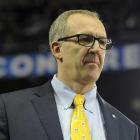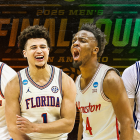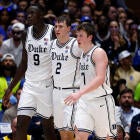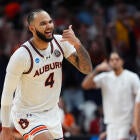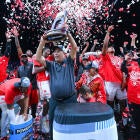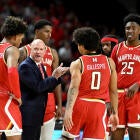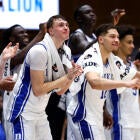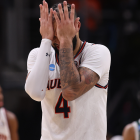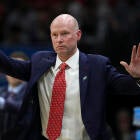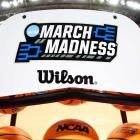There is no more academic fraud. Cheating might as well be a major.
The NCAA made it so Friday. North Carolina got off scot-free in the mother of all academic misconduct cases. Not even a slap on the wrist, not a speeding ticket. Not even a warning.
Even Tar Heels drinking the Carolina blue Kool-Aid had to be surprised Friday.
A case that the NCAA's own enforcement department said provided North Carolina "a competitive advantage" ended finally and pathetically.
A case that the NCAA's investigators said demonstrated "a willful pattern of violations" and "blatant disregard for NCAA bylaws" concluded.
With nothing -- except the implied message that all the crap we waste so much time wringing our hands over might as well be allowed.
At the end of a half-hour conference call, infractions committee chief hearing officer Greg Sankey complimented a reporter who unearthed most of the damning information at UNC.
"You did great work. Maybe the enforcement staff should hire you," Sankey said.
Or maybe the enforcement staff is so pissed off right now, it can't see straight. This was their baby, their work, their obvious home run after more than six years of investigation.
Instead, Sankey's committee waved North Carolina through a busy intersection lined by friendly cops. Nothing to see here, move along.
To put it in language Roy Williams can understand, not even a touch foul.
After what was described as 18 years of academic misconduct, after what was meticulously reported by the Raleigh News & Observer as clear a pattern of cheating, the NCAA stood down.
"The panel is, in no way, supporting what happened," Sankey said.
Then why are we here in the first place? Why didn't the infractions committee act, send a message to a collegiate model that is wrecked?
Does the FBI have to do everything?
Sankey's committee concluded it essentially was hamstrung by a 2014 adjustment in the definition of academic fraud. At that point, schools were allowed to define the term themselves based on their "own academic policies."
What's that old saying about inmates running the asylum? Given its own way, major college athletics almost always will bend the rules.
North Carolina broke them, mocked them in broad daylight and got by on a technicality.
In exonerating North Carolina, the COI took the word of a secretary with no teaching experience who favorably graded papers from classes that didn't exist.
Remember that? There were no "paper classes." They simply didn't exist. Students were allowed to turn in papers without seeing an instructor. Those papers were graded by admitted North Carolina basketball fan girl Debbie Crowder.
That's the definition of academic fraud. It doesn't matter if regular students were enrolled or given the same break. It's clear UNC athletes were clustered in the AFAM classes because of Crowder and her one-time boss Julius Nyang'oro.
Before the Friday 10 a.m. ET release of the findings, UNC honks were concerned the NCAA might remove one (or two) championship banners. The NCAA had broken that seal in the Louisville case.
By noon, Tar Heels everywhere were planning happy hour. Not only did North Carolina beat the rap, but everybody did. Going forward, it's going to take the cut and paste of an entire Wikipedia page to commit academic fraud.
Except, that might have already occurred in those phony non-classes at UNC.
The enforcement staff called it a "competitive advantage." The COI gave North Carolina a free pass.
Don't ask me, ask Beth Bridger, a former UNC counselor who once provided this PowerPoint presentation to the Tar Heel football team.
"What was part of the solution in the past?" it asked.
"We put them in classes that met degree requirements in which …
- They didn't go to class.
- They didn't have to take notes, stay awake.
- They didn't have to meet with professors.
- They didn't have to pay attention or necessarily engage in the material."
And the infractions committee found nothing. College athletics will never be the same again. While the federal government digs down the cesspool that is basketball recruiting, the NCAA can't decide what amateurism is.
You know, the thing that allows the association to keep its nonprofit status and sign rights fees contracts worth billions?
That definition has been a moving target for decades. The cost of attendance all athletes get now? That would have landed you in NCAA jail a few years ago.
How are those bowl gifts football players get each year not extra benefits?
But a school can decide what and how many fraudulent classes it can offer. What's next, Internet Dating 101? Know Your Sugar Daddy? How To Sell Those Complementary Tickets For Fun and Profit?
Coffee, Tea and International Culture? Wait, that's actually a course offered at Florida State.
The lines are blurring.
The results of this case will no doubt resonate. After this, you wonder why there is even an enforcement division, or a Committee on Infractions.
They were clearly in conflict in this case. The enforcement staff that worked on this case for more than six years wanted to throw the book at North Carolina.
"Put simply," an enforcement reply stated in July, "serious violations occurred."
The committee adopted virtually none of the findings based on their investigative brethren's hard work.
So what we're left with is the reason the case was investigated in the first place -- Crowder's lack of credentials and rah-rah grading -- is part of the same reason North Carolina went free.
Thanks for meeting with the committee, Deb. That clears things up.
"Part of the commentary will be, 'Well, just have classes that are questionable, populate them with students and things will be fine,'" Sankey said.
"But our institutions are called to a higher standard of education."
That makes sense. Leave ethics and rules and compliance up to the schools. How has that worked out?
This year's NCAA rule book spanned 428 pages.
Get the latest on this developing story from insiders on the ground at Chapel Hill. They've been covering Carolina athletics for two decades and will have all of the fallout, including recruiting impact and what's coming next. Visit InsideCarolina.com right now.
![[object Object] Logo](https://sportshub.cbsistatic.com/i/2020/04/22/e9ceb731-8b3f-4c60-98fe-090ab66a2997/screen-shot-2020-04-22-at-11-04-56-am.png)








